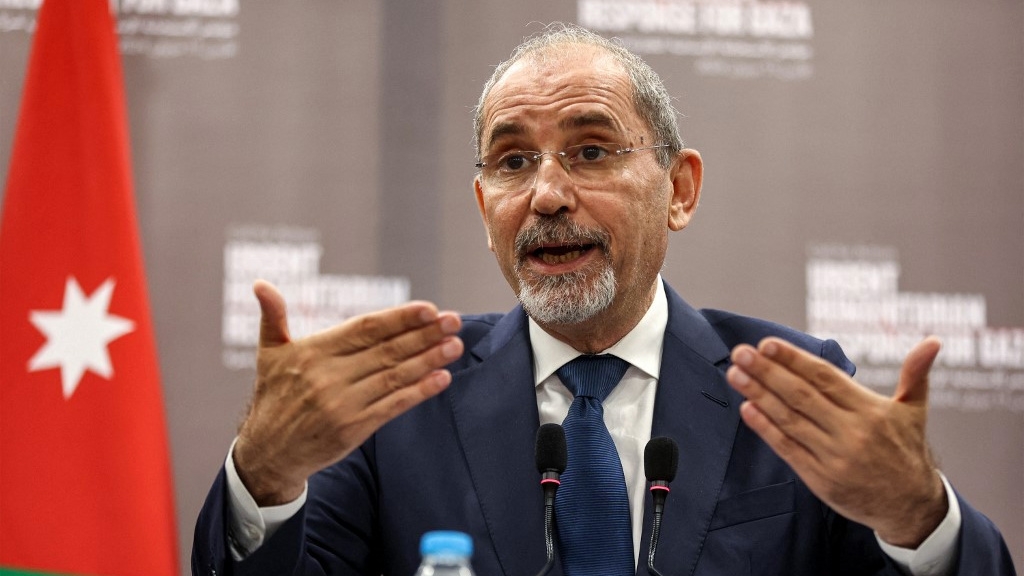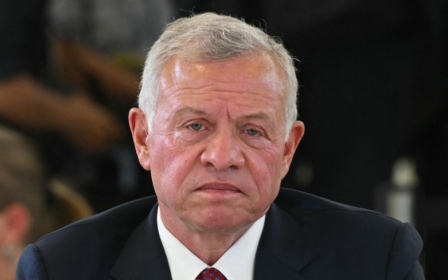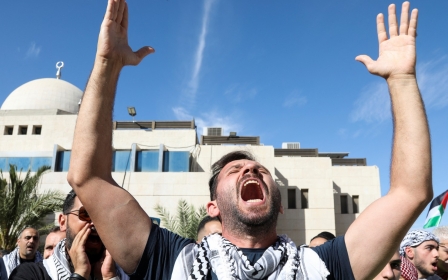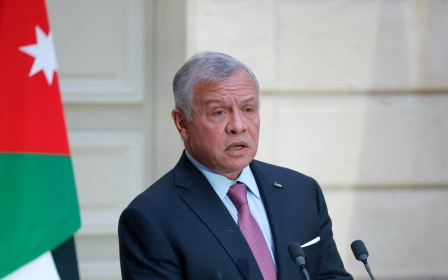Arab countries must stop appeasing a violent expansionist Israel

In a TikTok video posted to his official account earlier this year, Prime Minister Benjamin Netanyahu gave a group of orphaned children of Israeli soldiers a tour of his office, pointing to a picture of Al-Aqsa Mosque complex - only the mosque had been removed, replaced instead by a rendering of the Third Temple.
This is a picture Netanyahu looks at every day he is at work. It helps to shape the consciousness and decision-making processes of a leader who harbours ambitions to expand Israel’s territory through annexation or increased control over the occupied West Bank and Gaza, cutting off any possibility of a Palestinian state.
It was thus interesting to hear Jordanian Foreign Minister Ayman Safadi assert emphatically last week that 57 Arab and Muslim countries were willing to provide security for Israel in exchange for the establishment of a Palestinian state - despite the ongoing Gaza genocide and bombardment of Lebanon.
In addition to the Palestinian issue, Israel has done immense damage across the region, including in countries that have normalised relations with Tel Aviv, fomenting public unrest.
One cannot ignore the Arab world’s disregard for the political discourse in Israel, alongside the social and demographic changes the country has undergone over the past three decades.
New MEE newsletter: Jerusalem Dispatch
Sign up to get the latest insights and analysis on Israel-Palestine, alongside Turkey Unpacked and other MEE newsletters
During this time, the right-wing, led by Netanyahu, has succeeded in setting the political tone after the assassination of former Prime Minister Yitzhak Rabin, whose killing in the wake of the Oslo Accords signalled the dangers facing any leader who pushed for a peace process.
This mindset has intensified over the years, creating a consensus where there can be no compromise on large settlements, where Jerusalem belongs to Israel, and there is no right of return for Palestinian refugees. Even the religious right’s secular opponents dare not challenge these assumptions.
Deep conviction
Yet, despite the growing Israeli settlements, record numbers of raids on Al-Aqsa Mosque, and total lack of a political horizon, Arab countries continue to normalise relations with Israel. This could be based in part on a belief that improved relations would give them more leverage to push Israel to establish a Palestinian state.
In reality, the opposite is happening. Netanyahu boasts about how he has managed to advance normalisation with Arab countries while ignoring the Palestinian issue.
Follow Middle East Eye's live coverage of the Israel-Palestine war
In addition, there is a deep conviction within Israeli political culture that Arabs only understand force. Thus, while Safadi’s remarks last week conveyed the gravity of the situation and the importance of stabilising the region, Israel continues to view itself as “a villa” - or perhaps a fortress - “in the middle of a jungle”.
Israeli political and social structures fund these assumptions, including a mobilised media that promotes a right-wing discourse, in a society that predominantly speaks Hebrew and is not broadly exposed to alternative news sources. Public sentiments influence voting patterns and official decision-making.
The Zionist ethos believes that living by the sword is necessary, and that Arabs are fundamentally the “Other”. A good example of this is the Palestinian Authority, which has coordinated security with Israel for decades, even as the Israeli government relentlessly works to weaken it.
Tel Aviv will not stop fomenting chaos across the region unless Arab states take concrete steps to apply pressure
Contrary to Netanyahu’s declarations, Israel knows that its security situation is directly related to its own violent actions and the magnitude of its crimes. It does not face an existential threat.
It also knows that neighbouring Arab countries will defend it when needed, as per American demands, as happened during the first Iranian missile attack in April, and the second one this week.
And all of this is happening while Israel is led by Netanyahu, widely viewed as a Machiavellian leader who will do anything to cling to power.
With grand ambitions, Netanyahu is exploiting the current conflict to incessantly strike four Arab regions - the occupied Palestinian territories, Lebanon, Syria and Yemen - while misleading the Arab world with promises of a ceasefire, when no such plan is on the table.
Although Safadi has proposed a deal to guarantee Israel’s security, Tel Aviv will not stop fomenting chaos across the region unless Arab states take concrete steps to apply pressure, such as recalling ambassadors, cutting diplomatic ties, and setting clear red lines. Amid hyper-nationalistic and megalomaniacal leadership, the last thing on Israel’s mind is the stability of neighbouring Arab countries.
The views expressed in this article belong to the author and do not necessarily reflect the editorial policy of Middle East Eye.
Middle East Eye delivers independent and unrivalled coverage and analysis of the Middle East, North Africa and beyond. To learn more about republishing this content and the associated fees, please fill out this form. More about MEE can be found here.





